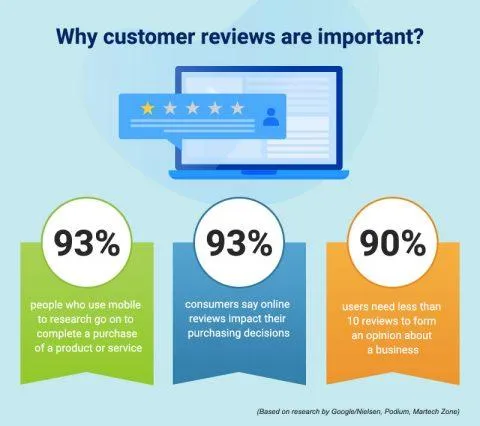
The Review Economy

The Review Economy: Why Your Next Customer Is Judging You Before They Call
In today's digital landscape, first impressions are no longer made in person—they're made online. For small businesses, online reviews have become a critical factor in attracting and retaining customers. Before a potential customer picks up the phone or walks through your door, they've likely already formed an opinion based on your online reputation.
The Power of Online Reviews
Online reviews serve as modern-day word-of-mouth, significantly influencing consumer decisions. According to a study by BrightLocal, 87% of consumers read online reviews for local businesses in 2020, and this number has only increased in recent years. Positive reviews can build trust and credibility, while negative reviews can deter potential customers.
Moreover, online reviews play a pivotal role in local SEO optimization. Search engines like Google consider the quantity and quality of reviews when ranking local businesses. A strong review profile can improve your visibility in search results, making it easier for customers to find you.
The Psychology Behind Reviews
Understanding why reviews matter requires delving into consumer psychology. People tend to trust the experiences of others, especially when making purchasing decisions. Reviews provide social proof, reducing uncertainty and helping consumers feel more confident in their choices.
Additionally, reviews can influence perceptions of quality and value. A product or service with numerous positive reviews is often perceived as superior, even if the actual differences are minimal. This perception can sway customers toward choosing your business over competitors.
Strategies for Managing Online Reviews
Effective customer review management involves more than just collecting feedback; it requires a proactive approach to monitoring and responding to reviews.
1. Encourage Satisfied Customers to Leave Reviews
After a positive interaction, kindly ask customers to share their experiences online. Make it easy by providing direct links to your review profiles on platforms like Google, Yelp, or industry-specific sites.
2. Respond to All Reviews
Engage with customers by responding to their reviews, both positive and negative. Thank customers for positive feedback and address any concerns raised in negative reviews professionally and promptly. This shows that you value customer input and are committed to continuous improvement.
3. Monitor Your Online Presence
Regularly check your business's online profiles to stay informed about new reviews. Utilize tools and services that alert you to new feedback, allowing you to respond in a timely manner.
4. Learn from Feedback
Use reviews as a source of constructive feedback. Identify common themes or recurring issues and implement changes to enhance your products or services.
The Impact on Local SEO
Online reviews are a significant factor in local SEO optimization. Search engines assess the number, frequency, and sentiment of reviews to determine your business's relevance and authority. A robust review profile can lead to higher rankings in local search results, increasing your visibility to potential customers.
Furthermore, reviews contribute to the freshness of your content, which search engines favor. Regularly updated reviews signal that your business is active and engaged with customers.
Case Studies and Statistics
Several studies highlight the importance of online reviews:
A Harvard Business School study found that a one-star increase in Yelp rating leads to a 5-9% increase in revenue for restaurants.
According to Moz, online reviews are believed to make up 10% of how Google and other search engines decide to rank search results.
A survey by Podium revealed that 93% of consumers say online reviews impact their purchasing decisions.
These statistics underscore the tangible benefits of cultivating a positive online reputation.
Implementing a Review Strategy
To leverage the power of online reviews, integrate review management into your overall marketing strategy:
Train Staff: Ensure that employees understand the importance of customer service and its impact on reviews.
Set Goals: Establish targets for the number of reviews and average rating you aim to achieve.
Use Technology: Employ software solutions to automate review requests and monitor feedback across multiple platforms.
Analyze Competitors: Study the review profiles of competitors to identify areas where you can differentiate and excel.
Conclusion
In the digital age, online reviews are a cornerstone of small business success. They influence consumer perceptions, impact local SEO rankings, and provide valuable insights into customer satisfaction. By prioritizing customer review management and fostering a culture of excellence, small businesses can enhance their reputation, attract more customers, and drive growth.
Remember, your next customer is likely judging you before they call—make sure your online reviews reflect the quality and integrity of your business.
References:
BrightLocal. (2020). Local Consumer Review Survey. Retrieved from https://www.brightlocal.com/research/local-consumer-review-survey/
Harvard Business School. (2011). Reviews, Reputation, and Revenue: The Case of Yelp.com. Retrieved from https://www.hbs.edu/faculty/Publication%20Files/12-016.pdf
Moz. (2018). Local Search Ranking Factors. Retrieved from https://moz.com/local-search-ranking-factors
Podium. (2017). 2017 State of Online Reviews. Retrieved from https://www.podium.com/resources/state-of-online-reviews/
Note: The statistics and references provided are based on studies available up to 2020. For the most current data, please consult the latest research and industry reports.
